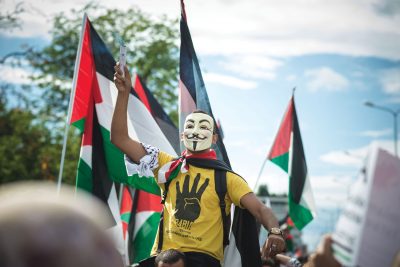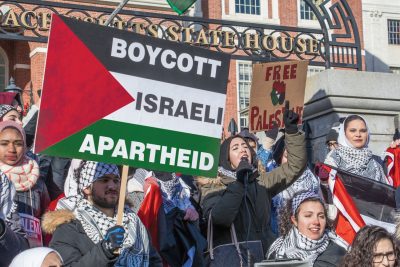×


We have detected your country as:
Please click here to go to the USA website or select another country from the dropdown list.
by: Ilse Strauss, Assistant Editor
 That is the banner under which the Boycott, Divestment, Sanctions (BDS) movement rallies its troops to launch assaults against Israel. The battle strategy is nothing if not brilliant. Proponents of the project pride themselves on working to end Israel’s alleged cruel oppression of the Palestinians. And those who march on the movement’s frontlines claim to fight for Palestinians having “the same rights as the rest of humanity.” Dishing up a victim narrative to a generation consumed with social justice has proven almost irresistible. Who doesn’t want to play a starring role in the quest against cruel injustice? Yet as internationals enflamed by an emotive rhetoric report for duty under the BDS banner, few realize that the assaults launched in the name of supposed freedom, justice and equality do little to isolate Israel. The true casualties in the BDS war are those on whose behalf the movement claims to fight so furiously. In fact, more often than not, when BDS claims a victory, it invariably equates to a bitter loss for the Palestinians.
That is the banner under which the Boycott, Divestment, Sanctions (BDS) movement rallies its troops to launch assaults against Israel. The battle strategy is nothing if not brilliant. Proponents of the project pride themselves on working to end Israel’s alleged cruel oppression of the Palestinians. And those who march on the movement’s frontlines claim to fight for Palestinians having “the same rights as the rest of humanity.” Dishing up a victim narrative to a generation consumed with social justice has proven almost irresistible. Who doesn’t want to play a starring role in the quest against cruel injustice? Yet as internationals enflamed by an emotive rhetoric report for duty under the BDS banner, few realize that the assaults launched in the name of supposed freedom, justice and equality do little to isolate Israel. The true casualties in the BDS war are those on whose behalf the movement claims to fight so furiously. In fact, more often than not, when BDS claims a victory, it invariably equates to a bitter loss for the Palestinians.
BDS says its efforts in the 11 years since its founding have born abundant fruit. The movement “is having a major impact and is effectively challenging international support” for Israel, its website proclaims. Experts disagree. Kristin Lindow, senior vice president at Moody’s Investors Service and Moody’s lead analyst for Israel told Forbes in 2015 that BDS “has had no discernible impact on Israeli trade or the broader economy.” Recently in The Algemeiner Paul Miller, president and executive director of the Haym Salomon Center, describes the movement’s sphere of impact as “student government associations” and “a handful of European communities.” In an article for The Algemeiner entitled “The Ongoing Myth of BDS Success,” Dr. Mitchell Bard, executive director of the American-Israeli Cooperative Enterprise and best-selling author argues that BDS’s divestment campaign has failed to such an extent that advocates now resort to desperate measures to be heard.
While BDS rages and boasts of meaningless victories, Israeli trade and industry remain largely untouched. The fate of the Palestinians and the Palestinian economy is, however, a different matter. “BDS spokespeople justify calling for boycotts that will result in increased economic hardships for the Palestinians…” shares Palestinian human rights advocate Bassem Eid. “It goes without saying that they themselves live in comfortable circumstances elsewhere in the world and will not suffer any such hardship.” The movement’s stalwarts, he charges, are “engaged in a self-serving narrative aimed at making them look like heroes,” often while the Palestinians carry the cost of the crusade.
 When BDS calls for boycotts against products from Judea and Samaria (Israel’s heartland that served as the stage for some 80% of the events in the Tanakh [Old Testament], erroneously labeled the West Bank), the call includes all products produced at the Barkan Industrial Park.
When BDS calls for boycotts against products from Judea and Samaria (Israel’s heartland that served as the stage for some 80% of the events in the Tanakh [Old Testament], erroneously labeled the West Bank), the call includes all products produced at the Barkan Industrial Park.
Located in the rolling hills of Samaria some 25 kilometers (15.5 mi.) east of Tel Aviv, the park comprises 160 businesses and factories manufacturing plastics, metalwork, food and textiles. The plant boasts a collective workforce of 20,000 employees, 60% of whom are Palestinians. Twitoplast, an Israeli company that develops, manufactures and exports plastic accessories for air conditioners to 23 countries, employs a staff of 150. “Half are Israelis,” says international marketing manager Moshe Lev-ran, “the other half Palestinians. We are like a big family, with sons following in their fathers’ footsteps to work for us.”
According to Lev-ran, all workers, irrespective of race, nationality or ethnicity, are entitled to the same rights and privileges, including equal salaries. At Twitoplast, an entry-level position pays US $2,000 per month. In contrast, companies operating in Palestinian Authority-managed areas offer $200-300 for beginners.
“Israeli companies currently employ some 100,000 Palestinian workers,” explains Lev-ran. “The typical Palestinian man is responsible for feeding an average of 10 people, including a wife, children and parents. Do the math. It means Israeli factories and industries support roughly 1,000,000 Palestinians. Imagine what that $2,000 salary means to 1,000,000 Palestinians every month. It equates to better housing, better food, better healthcare and a better education, which translates to a better future. It boils down to having a better life.”
 If BDS gets its way, Twitoplast, along with the 159 businesses and factories in the Barkan Industrial Park and the hundreds of other Israeli-owned companies operating in Judea and Samaria will cease their operations immediately, vacate their premises and set up shop somewhere within the pre-1967 armistice lines. Apart from the cost of relocating and settling into new premises, such a move will hold little long-term repercussions for established Israeli firms. However, the fact that it will render 100,000 Palestinians unemployed at worst and subject to a pay cut of up to $1,700 at best seems to be of little concern to the BDS advocates.
If BDS gets its way, Twitoplast, along with the 159 businesses and factories in the Barkan Industrial Park and the hundreds of other Israeli-owned companies operating in Judea and Samaria will cease their operations immediately, vacate their premises and set up shop somewhere within the pre-1967 armistice lines. Apart from the cost of relocating and settling into new premises, such a move will hold little long-term repercussions for established Israeli firms. However, the fact that it will render 100,000 Palestinians unemployed at worst and subject to a pay cut of up to $1,700 at best seems to be of little concern to the BDS advocates.
This is unfortunately not an entirely hypothetical scenario. In 2014, BDS prided itself on prompting a decision by SodaStream to relocate its factory in Judea and Samaria to the Negev Desert. As the manufacturers of the carbonated fizzy drink packed up its premises, spontaneous celebrations erupted in the BDS camp and SodaStream became the poster child for the movement’s supposed success in tightening the screws on wicked Israel. However, in BDS’s haste to pat itself on the back, it failed to spare a thought for the hundreds of Palestinian factory workers who could not relocate with the factory. “The BDS movement has threatened my job security and livelihood. It damaged the livelihoods of hundreds of SodaStream factory workers, who were laid off as SodaStream left its facility in the West Bank,” SodaStream factory manager Nabil Basherat shared in Defeating Denormalization: Shared Palestinian and Israeli Perspectives on a New Path to Peace. The Israeli company, on the other hand, continued to thrive and in August this year sealed a whopping $3.2 billion agreement with beverage giant PepsiCo, a deal that SodaStream CEO Daniel Birnbaum hailed as a victory over the anti-Israel bycotters.
This begs the question: why would BDS continue to tout victories that clearly harm the people whose rights it supposedly promotes? Bassem Eid offers the answer in a The Times of Israel blog. “The BDS movement is not interested in hearing the Palestinians’ pleas because they would rather see Palestinians live in poverty than relent in their pursuit against Israel.”
Photo Credit: MDGRPHCS/Anton Balazh/shutterstock.com
All logos and trademarks in this site are property of their respective owner. All other materials are property of Bridges for Peace. Copyright © 2024.
Website Site Design by J-Town Internet Services Ltd. - Based in Jerusalem and Serving the World.